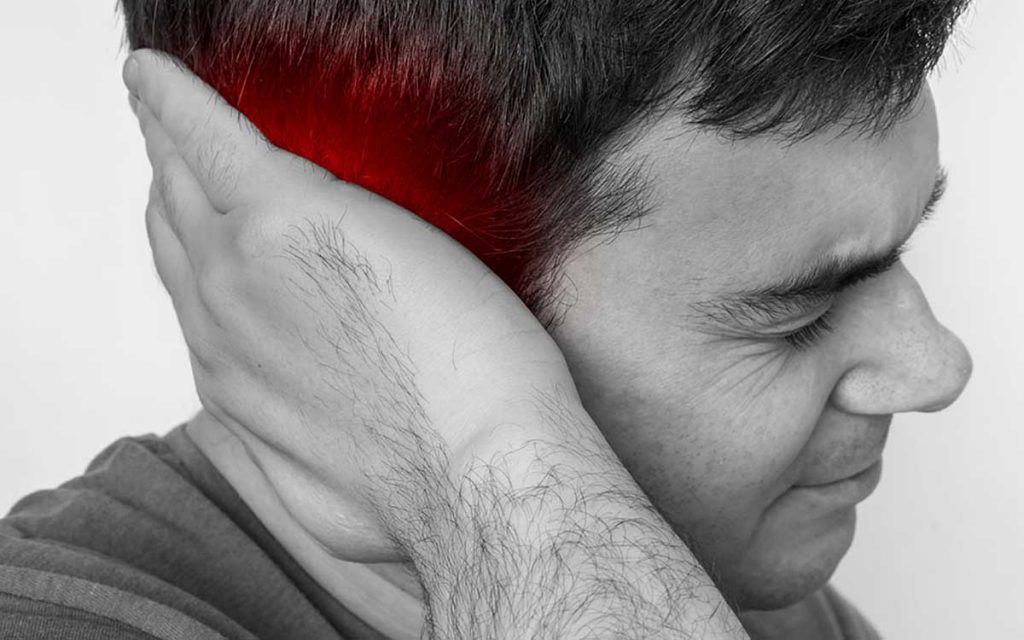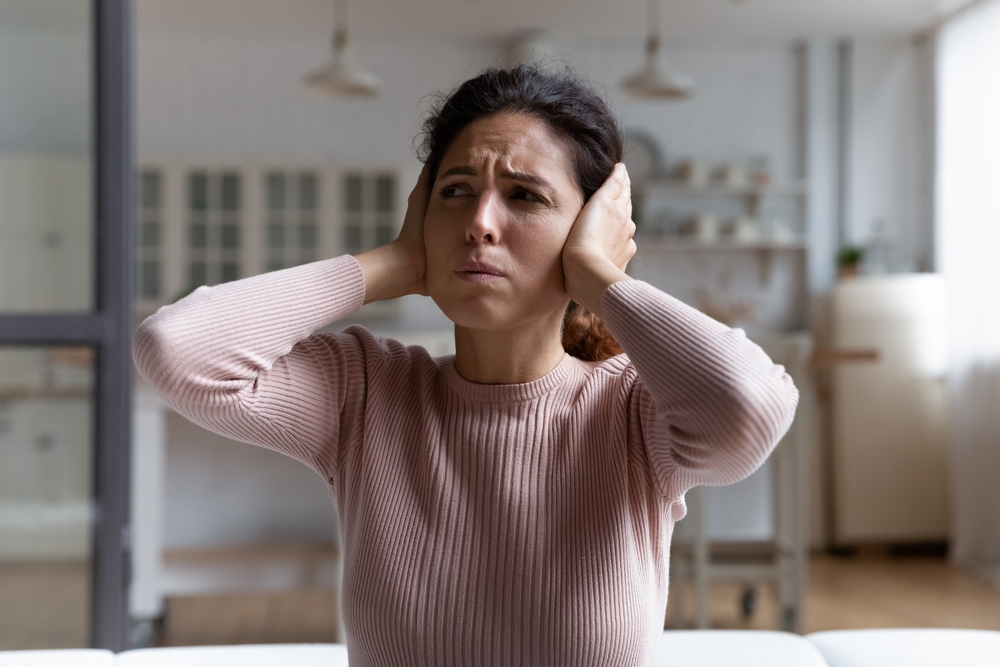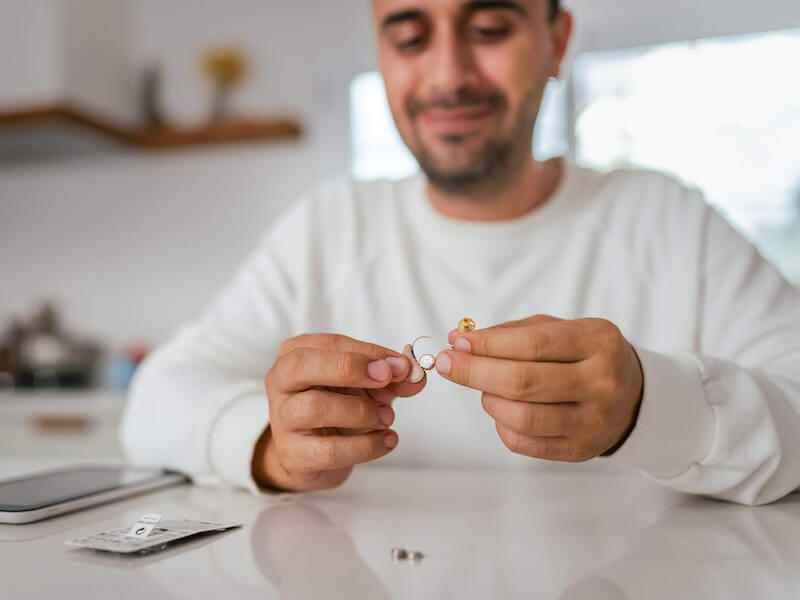What’s that strange noise that kind of sounds like white noise, or wind in your ears? Why can’t anyone else hear it? It’s not your imagination.
Fortunately, it’s probably not “phantom ring syndrome,” a condition where people who use cell phones excessively think they hear their phone ring, buzz, or beep when no one’s calling or texting them.
But it could be tinnitus. And yes, what you’re hearing is real, and there are some things that can make tinnitus worse.
You can still hear what people say. It just sounds like there’s some sound transposed on top of everything you hear.
Let’s look at where this white noise comes from, what it is, and what you may be able to do to reduce or get rid of it.
What is tinnitus & why do I hear this white noise in my head?
Tinnitus is (usually) a form of hearing loss. It’s characterized by a constant or intermittent noise that sounds like it’s on top of what you hear. Depending on the type of tinnitus you have, it may be unnoticeable most of the time. Or you may be saying, this white noise in my head feels deafening, threatening to take my sanity.
You’ve probably tried to explain to people what you’re experiencing, but this form of hearing loss is difficult for people to understand if they’ve never experienced it for themselves.
How can this humming noise in my head not be there? Is it a hallucination? How can it keep me from understanding those around me? Or sleeping?
What is the noise you hear when it’s quiet?
You’ve probably noticed that the quieter it is, the worse your tinnitus gets. That’s because the noise you hear in your ears does not have to compete with any other sounds – for example, most people keep their bedrooms completely silent while they sleep at night. They don’t have any TV playing, no radio, no noise at all. Add to that the fact that you’re probably alone with your thoughts during this time, and when you start to notice the buzzing or humming in your ears, it turns into the only thing you can think about, making the symptoms seem even worse. Whether you experience soft or loud noises, low or high pitches, a quiet bedroom at night time is the perfect situation for tinnitus to take hold.
Is that weird sound like wind really tinnitus?
Not only is tinnitus hard to explain to someone who doesn’t have it, but this condition can also become complicated when you try to talk to someone else who is suffering from tinnitus. They may be experiencing very different symptoms than your own, which might lead you to think that what you have isn’t tinnitus at all.
But chances are, it is. That’s because tinnitus takes many forms and sounds different to different people. These include, but aren’t limited to, hearing:
- TV static
- Humming
- Buzzing
- Ringing
- Thumping
- Dial tone
In most cases, you’re the only one who can hear the white noise caused by tinnitus. So if you ask a primary physician to confirm your symptoms, they probably can’t. Instead, the doctor will just have to take your word for it on this one.
This can cause people to feel invalidated by a doctor who doesn’t specialize in hearing loss.
Thomas, a steelworker, told us, “When the ringing in my ears started, I talked to my primary doctor. While the doctor did state that it might be tinnitus, he didn’t really seem to understand how debilitating the noise was. He spoke about it like it wasn’t really there. He seemed to think I could just ignore it and really didn’t offer any solutions.”
Speaking with a specialist can help solve this problem and can help identify solutions. Sometimes the sound itself can offer clues as to how to treat it.
Well, it’s really more of a whooshing sound in my ears
What makes it even harder to describe this noise to a doctor is the fact that there are so many different ways tinnitus can manifest itself. For example, if you hear a whooshing sound or a thumping sound in your ears, which is then followed by a steady series of beats that mimics your pulse, you may actually have a rare type of tinnitus called pulsatile tinnitus.
The good news is that pulsatile tinnitus can be treated more effectively than regular tinnitus since it’s usually caused by one or more health problems, like high blood pressure or issues with your arteries.
That whooshing sound can also be brought on by the flow of blood through narrow veins in your head, which is called a bruit. It’s critically important to get this checked out and treated, as in rare cases, the whooshing sound could be a sign that you’re heading for a seizure or stroke, either of which could prove fatal.
Sometimes hearing specialists can hear that buzzing noise too
Tinnitus is a genuine – and quite annoying – condition. While it often can’t be diagnosed, there are rare instances that concern pulsatile tinnitus, where a hearing specialist trained to treat tinnitus can use instruments like a stethoscope to hear what you’re hearing. But remember that this only occurs in cases of pulsatile tinnitus, which is far less common than the typical form of tinnitus.
How did I get tinnitus? What caused this humming noise in my head?
The most common cause of tinnitus is a loud noise that you were exposed to over a period of time. It’s very common among musicians and other people who spend a lot of time around loud music, as well as several other professions where workers are exposed to loud noises day in and day out for long periods.
There are some professions that are loud enough to cause workers to develop tinnitus, such as:
- Factory Work – You’re around noisy machines all day long, so that’s got to do something with your senses, right? On top of the noise, factory work can be stressful, which is another factor that leads to tinnitus and, over time, can make it much worse. Do you work near a pneumatic riveter? They are some of the worst, clocking in at over 125 decibels, which is loud enough to cause immediate, permanent hearing loss, as well as severe cases of tinnitus.
- Modern Farming – Don’t blame it on the roosters. While those loud, early-risers clock in at around 90 decibels, there are many things on the farm that are much louder. Tractors, combines, cherry-pickers, milking machines… all of these farming implements make a lot of noise. Need to repair the fence? Even your table saw can pump out over 85 decibels, which is damaging over long periods of time.
- Pilot – A jet engine is a staggering 140 decibels, even if you’re 100 feet away. While pilots do tend to wear ear protection, they’re often right next to these engines in smaller crafts. There’s no ear protection strong enough to protect them against this constant exposure, so all those hours spent in the air getting their pilot’s licenses are also causing them to slowly lose their hearing.
- Motorcycle Cop – You don’t have to be a police officer to ride a motorcycle, but any job that has you riding around on this noisy vehicle all day puts you at risk to develop tinnitus and eventually lose your hearing. The same goes for snowmobiles and jet skis…though chances are you’re not riding these vehicles at work unless you have a very interesting and, let’s face it, fun job.
- Bartender – A person at the end of the bar calls out for a gin and tonic, and you need to be able to hear their order. But the music in these places is often so loud that you can’t hear someone right next to you, so your ears are constantly straining and working overtime to pick out what people are saying over the din. And if a live band is playing? Your ears might get damaged in the same way a musician’s hearing will.
In all of these instances, the tiny hairs inside the inner ear were damaged by constant exposure to loud noises. These hairs pick up sound and help the brain to understand what you’re hearing. Unlike the rest of your body, when these hairs are damaged, they don’t heal or reproduce and leave you with a distorted sense of hearing.
What makes this strange noise in my head worse?
On top of sound exposure, certain environmental and health factors can make the white noise in your ear worse.
- Anxiety and depression – Both of these afflictions can cause a vicious cycle. As your anxiety or depression symptoms intensify, your tinnitus gets worse, which then leads these mental health conditions to worsen.
- Not Listening to Your Ears – Your ears become uncomfortable when sound is too loud. Don’t just grin and bear it – take care of your ears, because they’re the only ones you’ve got.
- High Blood Pressure – Letting your blood pressure get out of control may cut the oxygen off to your inner ear. This may not only make it worse in the short term, but it can increase the damage to your hearing over time.
- Smoking – That antsy feeling that you get in between cigarettes can worsen symptoms. While the answer may seem like you should have another cigarette, this is only making it worse the longer you smoke because of the impact smoking has on your cardiovascular system.
- Some foods – Some people find that caffeine and artificial sweeteners make tinnitus worse. Keep a food journal to track everything you eat, along with your tinnitus level, to find out which foods make your symptoms worse.
- Some people – Being around certain people, especially people with a very negative outlook, can make tinnitus worse because it triggers high blood pressure, anxiety, and depression. Consider relationships that may be doing you more harm than good and decide if they’re important enough to risk your hearing and health. Remember, you can’t change other people, but you can choose to be around them less often.
- Pregnancy – About a third of pregnant women experience tinnitus symptoms, which are often brought on by changes in their hormones and blood pressure, among other reasons.
- Deep wax build-up – Earwax pressing on the eardrum can cause odd sounds. Having that wax removed professionally could instantly stop the ringing in some cases.
- Some medications – Opiates, antibiotics, diuretics, chemotherapy and over the counter painkillers have all shown a link to tinnitus, so you should speak with both a hearing specialist and your primary doctor to understand the risks and side effects.
Are there any treatments for tinnitus that work?
If you have an underlying condition, talk to your doctor. Some conditions make tinnitus worse like anxiety or high blood pressure.
Once any known medical condition has been treated, it’s time to look at other options. These include:
- Meditation, Yoga, or another relaxing activity to reduce stress. Managing stress in a healthy way without substances isn’t something that most people learn at home or in school. Many people choose to learn them because they find that these techniques work.
- Using white noise to mask the sound while you sleep. White noise can offer immediate relief. Never try to drown the sound out with earbuds or with other loud noise exposure. That would only make the symptoms worse over time.
- A hearing aid, which can be set to cancel the sound. Hearing aids today have advanced features like tinnitus cancelation. They can be programmed during the hearing aid fitting to emit a sound that cancels out the specific tone you hear.
- Sound treatment, which trains your ear to ignore the sound. Sound therapists emit a sound into your ear that mimics the sound you hear. It teaches your brain to ignore the sound and focus on other sounds like voices.
- Cognitive Behavioral Therapy (CBT). This is a technique used by mental health professionals to undo harmful habits. If you obsess about negative news or life events you can’t control, CBT can help. It will retrain you to focus on the positive and where you do have the power to change things. This helps reduce stress.
Can listening to white noise help cure my tinnitus?
You’ve heard of fighting fire with fire, but what about fighting white noise with white noise? A recent study in England found that while white noise therapy helps those afflicted by tinnitus, it needs to be paired with additional treatments.
There is currently no known cure for tinnitus – only treatments that can help you better manage your symptoms.
So what else can you do to treat your tinnitus? Most importantly, you should get your hearing tested. You’ll find out how much it’s impacting your ability to understand when people speak. After that, you should discuss treatment options with your local hearing experts.
What if I hear music in white noise? Or voices or other things?
This probably isn’t tinnitus. And don’t worry, it’s probably not a form of schizophrenia or other psychiatric condition either. The most likely cause is Musical Ear Syndrome, apophenia, or audio pareidolia. Your brain uses pattern recognition to try to make sense of sounds. Sometimes it misinterprets what it hears. For example, pareidolia is when you interpret those meaningless noises into something you’ve heard before, such as music. If there is no noise whatsoever, yet you still hear music, this may be a musical hallucination.



